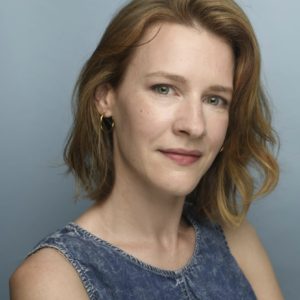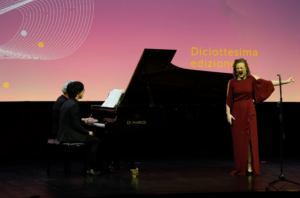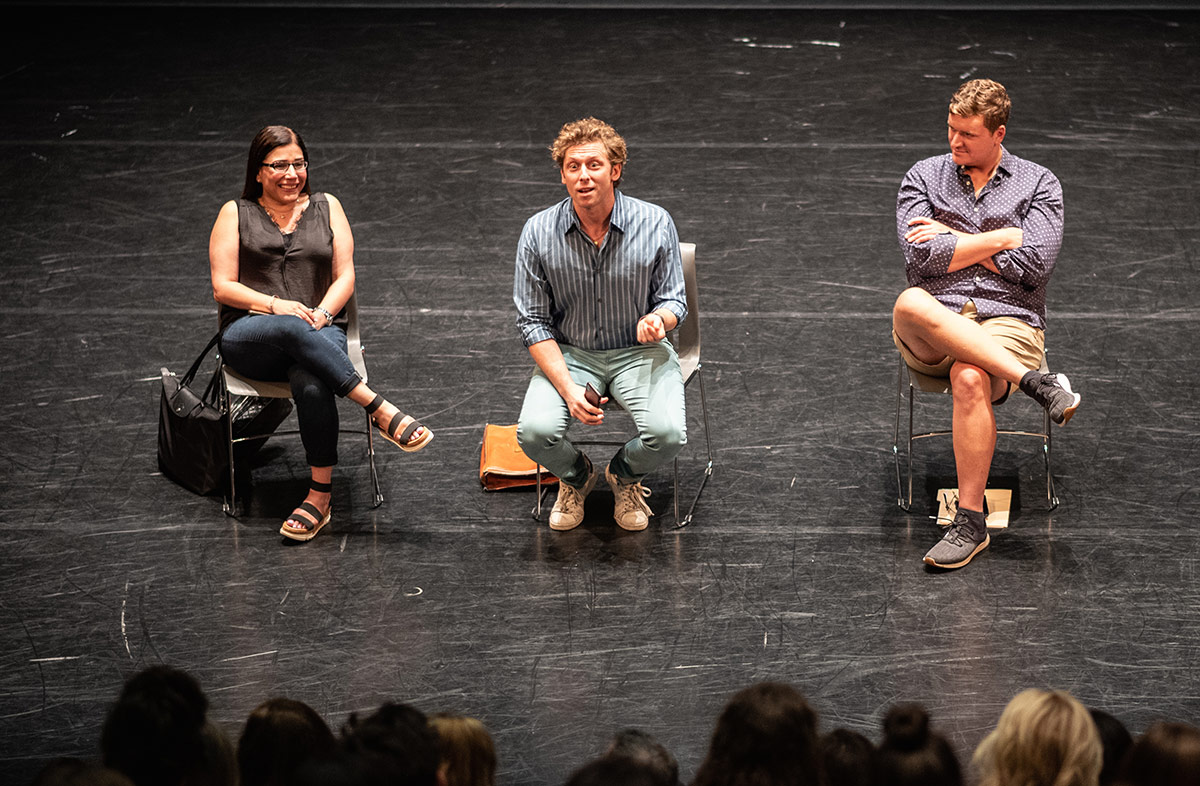We all know the feeling: you’re sitting in a hushed theater. Everything has gone still, as though each audience member is holding their breath and is training their entire attention on a performer. This performer has slipped out of our world, slipped off the stage, and has entered the world of the play. They are available to us, visible and vulnerable to us, but are drawing us through the same portal they have disappeared into so that we, too, can live for two hours in the sordid extravagance of 1880s Paris, or the hyper-social rush and fumble of 1980s New York.
How can you tell a performer who is merely saying their lines from one who has achieved this seeming magic trick? This sleight-of-hand miracle we often call “becoming the character?” The short answer is: you just do.
The long answer is: it takes time, it takes dramaturgy, and it takes a courageous imagination. It takes time as an actor and as an audience member to hone your powers of observation to a degree where you can tell technique from instinct. It takes time, also, to allow what you’re observing to sink into your very being, to become second nature. It takes dramaturgy (studying the play) to begin to ask the right questions of the character. Who are they? What matters to them? How are they in relation with the world? And then it takes imagination to enter that world, to live inside of it, to see it and touch it and smell it the way the character would.
You’ll learn how to do all of this in a conservatory program. The good news is, you can get an early start with MTCA.
One of my favorite, favorite pieces of acting wisdom is something I heard from Dale Moffett, former head of acting at SMU who also directed me at Juilliard. After each rehearsal he said “let it wash,” by which he meant “let the work you’ve just done in rehearsal gently invade your subconscious. It’s part of you now. Don’t work at it, just let it be true.” In that wonderful way that acting advice gets passed down from generation to generation, I say the same all the time to my students.
However. Nothing is going to wash if you haven’t done the work. What work? Great question. The foundation of any monologue, any scene, any play, is dramaturgy. Sound boring? It’s not! It’s the most exciting part of the process! You get to be a reading detective! You get to parse out what you know, what you think you know, what you don’t know, and what you want to know.
I know that you know how to read a play. However, and this is crucial, there are some essential differences between how we approach a play as a student, and how we approach a play as an actor.
In school we learn how to read as academics: What’s the theme of the play? What is the playwright trying to say? How does this piece knit into the cultural context of the time? But in conservatory, we have to learn to read as actors: How long have I known this person? When exactly did I accidentally knock over that precious vase? How long before they found out? Before we can make any interpretive choices of our own, we have to know what’s there. If it’s a good play, the playwright will have given us a lot of information to work with, and we, as actors, need to find every last morsel.
Then we get to use our imaginations. Maybe we imagine we’ve always been a little bit jealous of our mom’s favorite vase. Maybe we imagine that we dabble in pottery ourselves and know we can never make anything as exquisite as that vase. Maybe we’ve always thought the vase was ugly and didn’t have the courage to say it.
Maybe it’s as simple as imagining it’s a very hot day and our palms were slippery when we tried to move the vase, or that we’re hungry for lunch and weren’t looking where we were going.
If you’ve done that initial dramaturgical work, then your imaginative work will feel supported, like it’s coming out of its own logical universe. You can continue to pose these creative questions, and draw creative conclusions until the end of time. Or at least, until the end of a Broadway run. And guess what? This is exactly the kind of exploration that will keep a monologue feeling fresh for the duration of the college admissions process. And it all gets laid as the foundation of the piece in those first dramaturgical sessions with your coach.
Now, how does this relate to “becoming the character?” In essence, becoming the character is having a strong imaginative foundation to draw upon. It’s being able to say “okay, in this run I want to imagine that my mom is furious I knocked over her precious vase, and then in the next run I want to imagine she’s just confused and sad.” Both of those options might be perfectly valid and supported by the text. You’re then free to play within the structure of what the playwright has given you. Nothing is more important than introducing variety and play and surprise into your work while also feeling the play under your feet.
Sound like a lot? It is! And this brings us back to time. It takes time to figure out which choices resonate most for you. It takes time to ingest them into your work. It takes time for the fictional world to feel full and inhabited in your mind’s eye in a way that feels natural to you. You don’t want to walk into a room having to remind yourself “oh right, my scene partner’s birthday was yesterday and I missed the party.” You want to charge forward with those circumstances, and know how you’re situated in space and time.
Which is why my number one piece of advice for you at this stage of the process is: coach early and often. You might be wondering, “okay, beyond selecting pieces how is my coach really going to help me?” and the answer is: they’re going to guide you through all of this work! Through exercises, notes, or pearls of wisdom they’ve received from their teachers and directors, they are going to help you lay this super strong foundation for the months to come.
I speak from some experience when I say that I didn’t know how to read as an actor when I entered conservatory. I didn’t have the tools to even know what that would look like. It’s hard to imagine how it works until you’ve learned how to do it, and then once you’ve learned, you start to see it everywhere. You start to see it in your favorite performers, and you think to yourself “okay, I might not be able to do that just yet, but I can see where I’m going.”
It’s not enough to walk into auditions with the first version of a piece that occurs to you. It takes depth of exploration to make it through the long haul of the year. But if you commit to that exploration early, if you’re diligent and adventurous and courageous, by the time prescreens come around in the fall, then you can sit into all the hard work you’ve done and “let it wash.”
About the Author

Originally from Cleveland, OH, Gwendolyn got her BA from Vassar College in a multidisciplinary major called “Text and Performance,” and her MFA from Juilliard (Group 45). Favorite theater credits include the world premiere of Still by Jen Silverman, and Tom Stoppard’s Arcadia. Between college and graduate school, she was an Acting Apprentice at the Actor’s Theatre of Louisville where she was in A Midsummer Night’s Dream, A Christmas Carol, and Heist!, an immersive theater piece for the Humana Festival. After graduating from Juilliard, Gwendolyn made her television debut in Emmy-nominated Genius as Young Elsa Einstein. This past year you might have seen her as Martha Gellhorn in The First Lady or Julia Swanstrom in The Endgame. Other TV credits include Sink Sank Sunk, Blue Bloods, FBI: Most Wanted, and Madam Secretary. Gwendolyn absolutely loves coaching young artists with MTCA, and believes the essential nature of the performing arts is one where intergenerational dialogue strengthens the artistic point of view of both coach and student. She sees herself as the beneficiary of extraordinary guidance over the years, and relishes the opportunity to pass it on.




